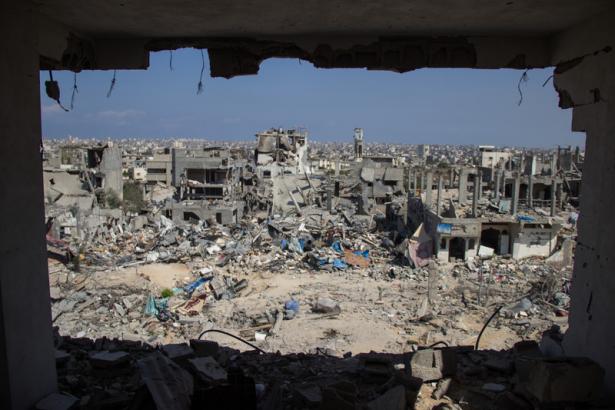Palestinians are calling for a boycott of Mohamed bin Zayed University of Artificial Intelligence in Abu Dhabi.
Earlier this month, the newly established university – named after the crown prince of the United Arab Emirates – held a virtual signing ceremony for a cooperation agreement with Israel’s Weizmann Institute of Science.
Collaboration between the two institutions will include student and staff exchanges, conferences, research and the establishment of a joint virtual institute for artificial intelligence.
Alon Chen, president of the Weizmann Institute, and Sultan Ahmed Al Jaber, the Emirati technology minister and chair of the university’s board of trustees, took part in the ceremony.
The Palestinian Campaign for the Academic and Cultural Boycott of Israel (PACBI) condemned this “normalizing” union.
Israeli academic institutions “play an important role in planning, implementing, justifying and reinforcing Israel’s ongoing military occupation and settler-colonial, apartheid regime against the Palestinian people,” PACBI stated.
The Weizmann Institute’s history of complicity is particularly grave.
Deep roots in war establishment
Formerly known as the Sieff Institute, it “officially joined” the ethnic-cleansing campaign led by David Ben-Gurion in February 1948, along with the Hebrew University of Jerusalem.
The Israeli institutions provided military research and “assistance with security services” to the Zionist war effort.
During the Nakba of 1948, some 800,000 Palestinians fled or were expelled from their homes and villages by Zionist paramilitary forces and were never permitted to return because they were not Jewish.
The Weizmann Institute was later renamed for Israel’s first president Chaim Weizmann, a leading figure in the Zionist movement.
One of the Weizmann Institute’s first researchers, Israel Dostrovsky, led the military research wing of the Haganah – the pre-state Zionist militia that carried out much of the ethnic cleansing.
The Weizmann Institute has undoubtedly been closely involved in Israel’s top secret nuclear weapons program, as well as research into chemical and biological weapons.
As it has from its earliest days, the Weizmann Institute still maintains close ties with Israel’s military and its biggest arms manufacturers including Israel Aerospace Industries and Elbit Systems.
Elbit and IAI are leading suppliers of weapons used in Israel’s attacks on Palestinians.
Elbit has supplied white phosphorus munitions and drones that have been used during Israel’s attacks on Palestinians and on Lebanon. It also manufactures internationally banned cluster munitions for the Israeli army.
Elbit markets its weapons as “battle-proven,” with the Israeli army’s successive attacks on civilians in Gaza as its showroom.
During their 2014 assault on Gaza, Israeli forces killed more than 2,200 Palestinians, including 550 children – an average of 11 children per day.
Arms to cybersecurity
The Weizmann Institute’s deep involvement in Israel’s arms industry is a perfect match for the Emirati university, which is closely tied to the government.
At least one member of the Emirati university’s board of trustees has already been affiliated with Israel’s arms industry: Peng Xiao.
Xiao is the CEO of Group 42, an Abu Dhabi-based artificial intelligence company that signed two agreements with Israeli weapons manufacturers Israel Aerospace Industries and Rafael in July.
Previously, Xiao was CEO of Pegasus LLC, a former subsidiary of DarkMatter, a cybersecurity company with close ties to the Emirati government that recruits veterans of Unit 8200, a high-tech spy branch of the Israeli military.
The UAE was collaborating with Israel’s cyberwarfare industry even before it signed an agreement to fully normalize relations with Israel.
Yigal Unna, head of the Israel National Cyber Directorate, told his Emirati counterpart during an online conference on Thursday that the two countries “are threatened by the same threats.”
Despite the two country’s mutual hostility towards Iran and the UAE’s alliance with Israel, Israel still refuses to give the green light for the United States to sell advanced F-35 warplanes to the Emirates.
It may be “six or seven years” before the Gulf state could get its hands on the American fighter jets, US ambassador to Israel David Friedman recently told Israeli media.
Meanwhile, in an interview with Israeli business publication The Marker, the president of the University of Haifa revealed the historic relationship between Emirati and Israeli universities.
Ron Robin helped New York University’s Abu Dhabi campus recruit faculty.
“I came to Abu Dhabi for the first time in 2007,” Robin told The Marker.
“I was flying between Abu Dhabi and Tel Aviv for eight years. It was my home during those eight years.”
Robin explained that he never hid his Israeli identity during his time there.
“The people who I dealt with understood I was Israeli,” he added.
Robin said he expects Israel to build relations with three Emirati academic institutions in particular: NYU Abu Dhabi, Mohamed bin Zayed University of Artificial Intelligence and United Arab Emirates University.
Tamara Nassar is an assistant editor at The Electronic Intifada.


Spread the word